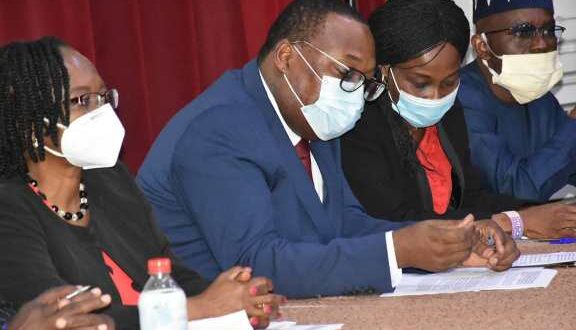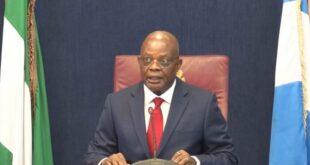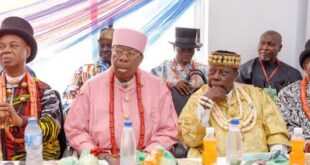The Nigerian Shippers Council (NSC), in conjunction with the Nigeria Ports Authority (NPA) and other maritime stakeholders, has launched the Nigeria Port Process Manual (NPPM), which stakeholders describe as a critical document for the sector.
Participants at the stakeholders sensitization programme on the implementation of NPPM, by the Project Steering Committee (PSC), held in Port Harcourt, the Rivers State capital, on 13 April 2021, say the NPPM document is one way to address corruption and moderate maritime activities to meet global maritime standard.
Addressing a gathering that included concessionaires, shipping agents, clearing/forwarding practitioners, as well as and other federal agencies such as the Nigeria Customs Service, NPA, NIMASA and NIWA, executive secretary of the Nigeria Shippers Council, Barr. Hassan Bello, described the port process manual as apt, noting that it is the only way forward to close the huge gap between what is happening in Nigeria and that in other developed maritime hubs across the globe.
Bello frowned at what he called “the abysmal poor rating of transparency/corruption index indicators in Nigeria”, adding that the launching of the Nigerian Port Process Manual will help to address the issue of corruption in the maritime sector of the country.
“NPPM is a key document to launch transparency and efficiency within the maritime corridors in Nigeria. It is unfortunate that Nigeria’s transparency index ranking in the world is 149th position out of 180 nations. For us, that is a near bottom position and we cannot continue in this way”, he said.
Bello noted that the Nigeria Shippers Council as a leading Federal Government agency in the fight of combating corruption in the nation’s shipping/maritime sector, adding that this cannot be done by NSC alone but is a collective responsibility.
While commending the Nigeria Ports Authority for the reduction in port charges, he suggested that one option that will help in check-mating corruption and as well promote transparency is for practitioners to key into automating processes, which he said will mean transacting businesses online.
He encouraged NIWA, NRC, NIMASA, Immigration and others to equally work towards ensuring transparency, adding that NSC is only leading the way, encouraging synergy with other agencies to make Nigerian shipping and maritime processes efficience.
Bello said the agency is desirous to reduce vessel turnaround time through collaborative vessel boarding by all concerned agencies at anchorage, while describing training as critical and very important to reduce unnecessary delays of vessels on anchorage at Nigerian Ports.
He pointed out that NSC is not competing with other sister agencies, but seeks cooperation and synergy, not only with other Federal Government agencies, but with concessioners and other shipping and clearing agents.
He noted that NSC’s message is simple: “There should be no delays, especially in the face of dwindling oil revenue. No competition, no rivalry. Nigerian Ports must be efficient. We are determined to work with you. We must ensure that Nigerian Ports is the hub in maritime activities in the sub region’’, Bello said.
In a welcome address, managing director of the Nigeria Ports Authority (NPA), Hadiza Bala-Usman, applauded the Project Steering Committee for job well done in the packaging and printing ‘The Nigerian Port Process Manual (NPPM).’
The NPA MD, who was represented by the general manager, Public Private Partnership (PPP), Mrs Eniola Williams noted the standard operating procedures (SOP) followed the same procedure as the NPPM.
She observed that NPA took the leading role in funding the steering committee which developed the NPPM document, stating that the manual contains detailed guidelines on port procedures.
“We believe that the manual will improve operations across the Nigerian ports and instill the culture of efficiency and transparency among maritime industry players’’, the NPA MD said.
She maintained that NPA will continue to be the gateway for economic activities in the country, adding that the authority will no doubt achieve their set goals.
While giving an overview presentation of the Nigerian Port Process Manual at the event, the deputy director, Special Duties at NSC, Mr. Moses Fadipe, said the process of producing an anti-system corruption manual, as seen today, is a 7 years journey, adding that the manual no doubt will improve Nigeria’s image on the corruption index.
He said the manual made proactive efforts to capture what ought to be operational processes from the Nigerian Customs, Nigerian Immigration, and other leading agencies.
Fadipe note that the operating procedure defines the activities of all the agencies and whom they are, adding that the manual has capacity for self audit, to ascertain whether positive progress is being made, or if things are getting worst.
He said what this means is that there will be a guideline for Nigerian Custom Service, Nigerian Immigration etc on their practice performance to ensure zero corruption practices.
Fadipe said that ‘A Port Standard Task Team’ will be on ground within the port corridors to ensure agency compliance with this document, adding that in doing this, NSC is involved as a leading agency with other sister agencies like NPA, Custom etc.
He said the manual makes provision for step by step activity for arrival of vessels, including joint agency boarding and examination.
“After today, we will interface. We will request for feedback to know where there are possible infractions’’, Fadipe said. He appealed to stakeholders to try and comply with the manual, and to ensure co-operations.
In an interview, Chief Ernest Elochukwu, former president of Association of Nigeria Licenced Cutoms Agents (ANLCA), commended the push by the Nigerian Shippers Council to find solution to the challenges facing shippers and other maritime groups in course of their trade.
He however faulted government for always playing to the gallery, by not complying with solutions that emerge from different workshops and seminars across the country in the past.
Chief Elochukwu queried the rational behind having more people and groups at the port, adding that this is not in line with global best practices. He observed that having more people and agencies at the port only promotes corruption, and mitigate efficiency and professionalism in the maritime trade/activities.
The former ANLCA president urged FG to take a second look at the way they prohibit items for import, stating that prohibiting essential commodities without corresponding local manufacturing, only promote corruption among members of the Nigerian Customs Service, as he called on government to re-consider.
Also present at the event were the port managers of Onne and Rivers ports, as well as Mrs Lilian Ekechukwu, representative of the Technical Unit for Governance and Anti-Corruption Agency Reform (TUGAR), who introduced the Nigerian Port Process Manual (NPPM).
Some of the stakeholders at the event applauded the Nigerian Shippers Council for their commitment to tackle corruption and unnecessary delays of cargo at the ports.
 PH Mundial – Port Harcourt Online Newspaper News Across The Region
PH Mundial – Port Harcourt Online Newspaper News Across The Region





